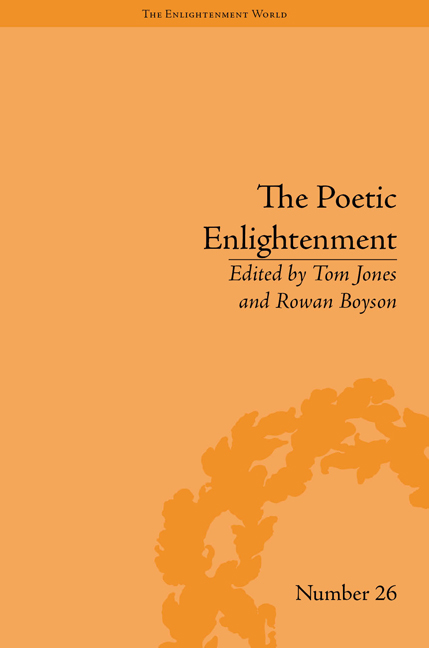Book contents
- Frontmatter
- CONTENTS
- Acknowledgements
- List of Contributors
- General Introduction
- I Poetic Knowledge and the Knowledge of Poetry
- 1 Introduction
- 2 Samuel Johnson and the Science of Literary Criticism
- 3 Prosody, Knowledge and Humanity in Enlightenment Language Science
- 4 Ferguson's School for Literature
- II Poetic Theories of the Social Self
- III Enlightenment and Romantic Poetologies
- Notes
- Index
4 - Ferguson's School for Literature
from I - Poetic Knowledge and the Knowledge of Poetry
- Frontmatter
- CONTENTS
- Acknowledgements
- List of Contributors
- General Introduction
- I Poetic Knowledge and the Knowledge of Poetry
- 1 Introduction
- 2 Samuel Johnson and the Science of Literary Criticism
- 3 Prosody, Knowledge and Humanity in Enlightenment Language Science
- 4 Ferguson's School for Literature
- II Poetic Theories of the Social Self
- III Enlightenment and Romantic Poetologies
- Notes
- Index
Summary
When Dugald Stewart came to look back on Adam Smith's prodigious contribution to the human sciences in his commemorative biography, he stressed repeatedly that Smith had always had a cultivated interest in matters of taste. Stewart reported that, since Oxford days, Smith had consistently ‘diversified’ his quest to comprehend ‘human nature in all its branches’, and especially its civic or ‘political history’, with the ‘less severe occupations of polite literature’ – that is, those forms of eloquence, and chief amongst them poetry, in which the Greek and Roman authors had retained much of their influence. Likewise, ‘Mr Smith's curiosity’ during his later stays in Paris proved that he had, in amongst his ‘other occupations’, built up an ‘extensive’ familiarity with classical and modern eloquence, and had ‘never neglected to cultivate’ a corresponding ‘taste for the fine arts’. All that notwithstanding, it seemed clear to Stewart that the realm of taste was not primarily, for Smith, an interest in and of itself, one that would operate on its own terms, or with some qualified autonomy. Instead, Smith's expansive intellectual projects seemed to value works of taste most obviously for the ‘facts’ that they could yield about cross-cultural and historical diversity. In other words, Smith had pursued the fine arts
less, it is probable, with a view to the peculiar enjoyments they convey, than on account of their connection with the general principles of the human mind; to an examination of which they afford the most pleasing of all avenues. To those who speculate on this very delicate subject, a comparison of the modes of taste that prevail among different nations, affords a valuable collection of facts.
As a philosopher, Smith had been keen to explore the ‘delicate’ tracks left by pleasurable thought, but pulled against any ‘peculiar’ distinctiveness of an engagement with, say, poetry.
- Type
- Chapter
- Information
- The Poetic EnlightenmentPoetry and Human Science, 1650–1820, pp. 43 - 58Publisher: Pickering & ChattoFirst published in: 2014



